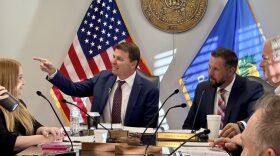The State Board of Education has ruled against two school districts complying with a court order to change sex and gender designation on records of certain students.
TRANSCRIPT
Dick Pryor: This is Capitol Insider - taking you inside politics, policy and government in Oklahoma. I'm Dick Pryor with Quorum Call publisher Shawn Ashley. Shawn, the State Board of Education meeting on Thursday was largely uneventful, but one particular item stood out. The board denied requests from two school districts, Moore and Cushing, to change the sex or gender designation on student records. Why were the districts wanting to do that and what was the board's basis for the denials?
Shawn Ashley: The districts were responding to specific students’ requests to change the designation on their records and were based on court orders the students had obtained. At the September State Board of Education meeting, State Department of Education General Counsel Brian Cleveland described the order in the Moore case as a general order that directed all government agencies to change the sex or gender designation of the individual involved. It was at the September meeting that the state board adopted an emergency rule that was later signed by Governor Kevin Stitt that prohibits local school districts from changing student’s sex or gender identification on student records without state board approval. As a result, the Moore and Cushing districts submitted their requests that were acted on Thursday. And as you mentioned, the board denied those requests.
Dick Pryor: The Joint Committee on State-Tribal Relations made up of state legislators has disapproved gaming compacts Governor Kevin Stitt reached with two Native American tribes in 2020. Why did the joint committee review those compacts?
Shawn Ashley: The compacts were the subject of one of the lawsuits filed in 2020 by Senate President Pro Tem Greg Treat and House Speaker Charles McCall. The lawsuit challenged the validity of the compacts because they contained provisions outside the model compact under which other tribes operate their casinos. The court ruled in 2021 the compacts could not take effect without the joint committee's approval because of their unique provisions. That was the first reason. In September of this year, more than two years after the court's ruling, Stitt and the leaders of the two tribes asked the joint committee to approve the compacts, which resulted in Wednesday's meeting.
Dick Pryor: So why did the committee disapprove the compacts?
Shawn Ashley: There seem to be several reasons. There was a process question. Stitt submitted the compacts to the U.S. Department of Interior, which must approve all state- tribal gaming agreements, in 2020 without the joint committee's review. Senate co-chair Brent Howard and Senate Minority Leader Kay Floyd expressed concern about the compacts receiving approval from the Interior Department before the joint committee's review. One of the unique elements of the compacts is that it allows the two tribes to operate casinos outside of their historic land areas - one in Oklahoma County and another in Logan County. And that seemed to be a concern for several members, particularly House Majority Floor Leader John Echols.
Dick Pryor: Interim studies are continuing at the Capitol, including one that is examining weakening of child labor laws, as has been done in a couple of other states. Iowa and Arkansas have new laws that make it easier for businesses to hire teenagers under the age of 16. Now, there are no such laws being considered in Oklahoma. So why are they studying this?
Shawn Ashley: Well, Representative Judd Strom, who requested the study, said he did so to explore an aspect of potential workforce expansion that gave him great concern. As you noted, two states loosened their child labor laws earlier this year, and up to a dozen other states were looking at similar legislation. And as we know, what happens in other states eventually makes its way to Oklahoma. Oklahoma Labor Commissioner Leslie Osborn argued there were better pools of people to fill Oklahoma's workforce shortages, such as veterans, the formerly incarcerated, immigrants who have been in the country for decades, the disabled, and the 1,100 people currently on waiting lists at the state career tech programs statewide.
Dick Pryor: All right, Shawn, thank you.
Shawn Ashley: You're very welcome.
Dick Pryor: That's Capitol Insider. For more information, go to quorumcall.online. You can find audio and transcripts at kgou.org and look for Capitol Insider where you get your podcasts. Until next time, with Shawn Ashley, I'm Dick Pryor.
Listeners like you provide essential funding for KGOU’s news reports, including Capitol Insider, available in podcasts, online and on the air. Information on how to contribute is at KGOU.org.
Copyright 2023 KGOU. To see more, visit KGOU. 9(MDA4OTAxNzAzMDEzMjc0MTc2MzA5ZDZlMw004))







